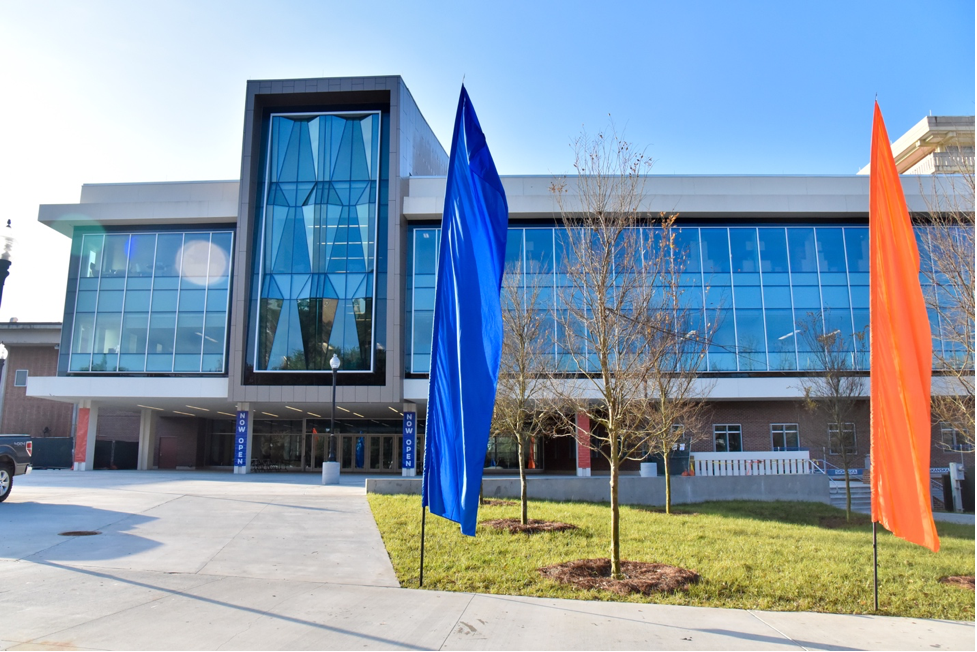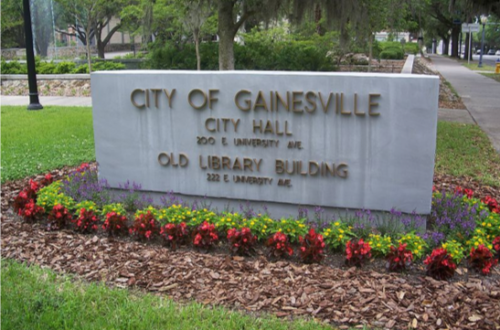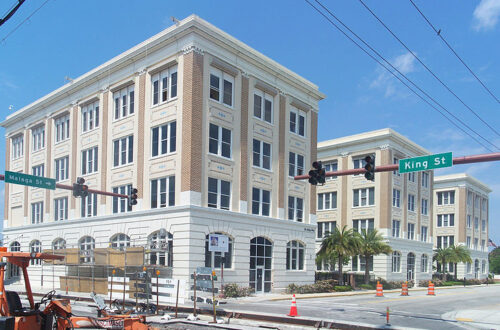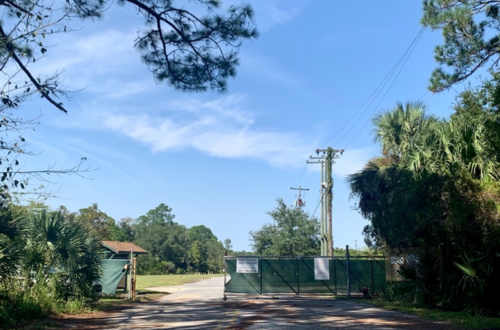In the center of the University of Florida campus and located within the J. Wayne Reitz Student Union, the food court run by Aramark is usually bustling with students. Now a monetary boycott is urging UF students and others on campus not to eat there.
The boycott is led by the Goddsville Dream Defenders, the Gator Chapter NAACP, the UF Black Student Union and the Coalition Against Prison Slavery with at least 13 other co-signing organizations. It began in January with aims to pressure the university not to renew its contract with food service provider Aramark.
Aramark has been the official food service provider for the university since 1995, managing all on-campus dining. The university’s contract with Aramark, set to expire in June 30, 2021, has been extended to June 2022.
University spokesperson Hessy Fernandez said the extension of the contract was due to COVID-19, but how exactly COVID-19 affected the extension is unclear.
“A competitive bid process is being conducted to select a food services provider for the next contract period that begins in July 2022,” Fernandez told the Florida Political Review. “The competitive bid process is open to any and all suppliers.”
Fernandez said UF has not made a decision yet.
Despite being named one of Fortune Magazine’s 2014 World’s Most Admired Companies, Aramark has faced criticism in several areas, namely for employee misconduct and ties to the U.S. correctional system.
UF ended its ties with prison labor statewide in September 2020 under student and community pressure, but as of yet has not terminated its contract with Aramark.
Currently, Aramark is facing a California lawsuit over its use of prison labor.
On Feb. 9, Judge Jon Tigar of Oakland ruled that incarcerated people who were forced to work without pay in Alameda County prison kitchens overseen by Aramark can sue both Aramark and Alameda County to implement minimum wages and overtime under California labor laws and the 13th Amendment.
This ruling rejected attempts by Aramark and the county to dismiss the lawsuit.
Dan Siegel, one of the attorneys representing the plaintiffs in the case, told the San Francisco Chronicle that Tigar’s decision “should provide a road map for other cases challenging the exploitation of county prisoner labor for private profit in California.”
When asked if they utilized prison labor, Aramark spokesperson Chris Collom told the Florida Political Review that although they run kitchen processes and procedures, “We do not control those assignments nor any compensation. All factors are determined by our client partners.”
Tigar ruled that the lawsuit’s claims, if proven, would show that the plaintiffs were employees of both Alameda County andAramark.
“I want to encourage the students in Florida and people all over the country to take up this issue,” Siegel told the Florida Political Review.
Salil Bavdekar, co-founder of CAPS at UF, told the Florida Political Review the boycotters are demanding that the new food service provider not utilize prison labor and also meet the Food Justice League criteria.
The Food Justice League criteria include implementing $15 minimum wage for workers, decreasing greenhouse gas emissions, increasing purchasing from local farmers, supporting supply chain workers, providing transparency, and remaining neutral in any union efforts.
Ava Kaplan, a member of the Goddsville Dream Defenders, told the Alligator that the boycott will continue until all of these demands are met.
“I think that all of our demands are very realistic,” Kaplan told the Florida Political Review. “They’re all things that need to happen.”
Kaplan said the boycott is uniquely situated to have a large impact as on-campus dining is expected to be suffering from fewer customers during the COVID-19 pandemic.
The ongoing boycott also addresses prison labor’s role in systemic racism.
In a June 18 letter addressing racism, UF President Kent Fuchs said, “The symbolism of inmate labor is incompatible with our university and its principles and therefore this practice will end.”
Black and Hispanic Americans are disproportionately represented in the U.S. incarcerated population according to the Pew Research Center.
Despite composing 12% of the U.S. adult population, Black Americans make up 33% of the U.S. prison population. In contrast, white Americans are 63% of the U.S. adult population but compose 30% of the U.S. prison population. Hispanic Americans compose 16% of the U.S. adult population and 23% of the U.S. prison population.
“As Black students at UF, we understand that prisons aren’t made for anybody else except us and history has told us that, statistics tell us that, and demographics tell us that,” Jerry Jerome, a student organizer who originally suggested the boycott and member of the UF BSU, said. “Prison is made for Black people.”
UF has not reached out to any of the organizations involved in the boycott according to the Gator Chapter NAACP, CAPS at UF and Goddsville Dream Defenders.
However, Collom told the Florida Political Review that they “have been discussing the situation regularly with the university.”
“While Aramark understands and respects the passionate debate around our nation’s prison system, it disagrees with how the company is being characterized and cast as part of the problem,” Collom said. “The company is actually part of the solution, with a strong commitment to rehabilitating incarcerated individuals so they can transition back to their communities.”
Rachel Khoury of the Gator Chapter NAACP told the Florida Political Review that student organizers at other universities such as Florida State University have reached out to the boycott coalition to inform their own organizing efforts.
“This isn’t a Florida thing; this is an America thing,” Jerome said.
Bavdekar echoed Jerome and noted that CAPS at UF has met with student organizers at the University of Alabama planning similar action as well.
“I think what’s important to mention is that a trend that I see with all the students and all the supporters of the cause is that it’s people who genuinely want change,” Jerome said. “Like we’re not driven out of hate for the university, we’re not driven out of hate for anybody, we’re driven out of a longing to be a community and uplift our people no matter what they look like, no matter where they are.”
Correction 9/23: This article has been updated to reflect The Alligator as a source of information regarding Ava Kaplan’s statements.
Featured image: The Reitz Student Union in the heart of the University of Florida’s campus. Unedited image by Reitz Union used under a Creative Commons license. (https://bit.ly/3pfUKrQ)
Check out other recent articles from the Florida Political Review here.






One Comment
Claire Olson
Protecting the dignity of all humans, and especially those with a diminished capacity to protect themselves, is an essential task for every citizen everywhere. Using unfairly compensated prison labor is a notoriously greedy practice that has gone on far too long and that needs immediate correction. This is an inspiring article showing the tenacity of UF students to stand up and demand change and to insist on fairness. As a preeminent university in the United States, the University of Florida needs to extend their leadership and integrity to the fight for justice and fairness at every level of society. To do any less would tarnish their ambition for excellence. Excellence extends beyond the classroom and lab to the wider community and world in which you find yourself. I hope the students keep up the pressure on campus and involve the wider community of Gainesville to join them.